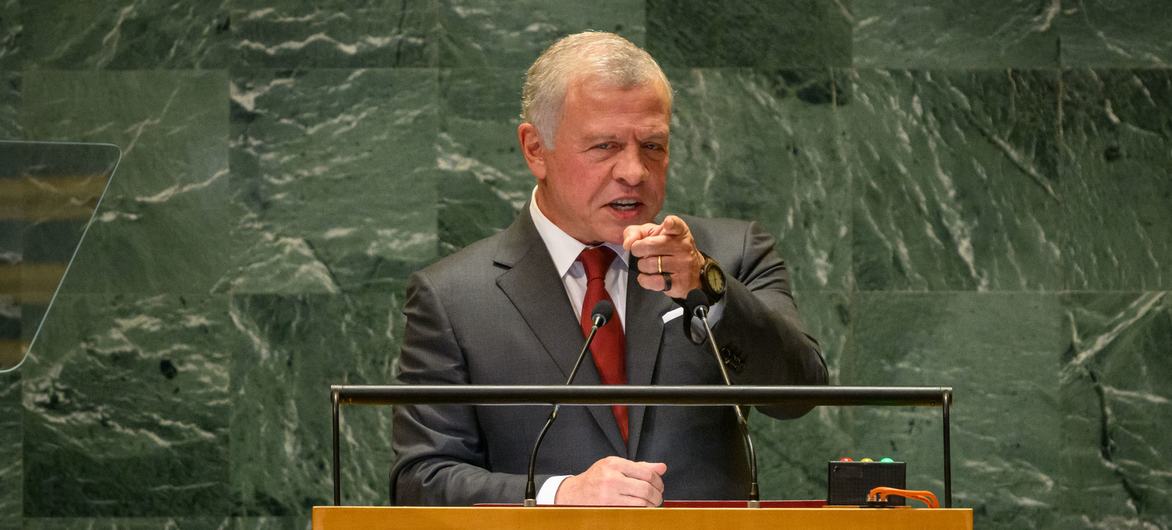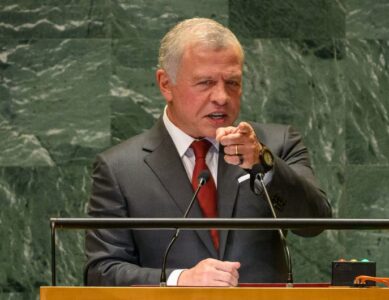In leadership, the first lessons often come from action — from how promises are kept, words are measured, and unity is built.
But the truer test lies deeper: in moments of pressure, when firmness must be shown without fracture, and when vision must outlast turbulence.
In this second part of Lessons in Leadership from His Majesty King Abdullah II, we turn to the qualities that define endurance — the wisdom to hold one’s ground without closing the door, and the conviction to stand for justice even when the world turns away.
Here, leadership meets legacy — not in titles or acclaim, but in the quiet moral authority that history itself remembers.
6️⃣Winning with Firmness, Without Fracture:
Leadership often demands firmness under pressure, but equally, it requires the wisdom to know how to deliver that firmness. His Majesty King Abdullah II demonstrated this with clarity and poise in his meeting with President Donald Trump in February, 2025.
His Majesty King Abdullah II delivered a masterclass in diffusing a situation that might have fractured a vital relationship through statecraft, human insight, and emotional intelligence.
Mr. Trump’s language, steeped in the transactional ethos of real estate and dominance, carried veiled threats, invoking the aid the United States provides as leverage and pressing demands that cut against Jordan’s red lines. Watching His Majesty defuse this situation was like watching the Bruce Lee of diplomacy: precise, decisive, disarming with grace, and unyielding in principle.
He began with one well-placed compliment that aligned with Trump’s often-stated self-image as a deal-maker and peacemaker, lowering the temperature in the room. Then he offered a diplomatic win to President Trump: Jordan would extend medical care to two thousand critically ill children and return them home. A principled refusal paired with a humanitarian gesture i.e. de-escalation without concession. Jordan had already treated, and was continuing to treat, many gravely ill children. In that moment, restraint carried greater impact. That is bridge-building: creating a channel of warmth and dialogue, not a wall of hostility.
Lesson: Leadership is not only about standing firm, it is about how you stand firm. A wall ends the conversation. A bridge keeps it alive. The right words, chosen with care, can disarm tension, protect national interests, and maintain relationships even in the face of such disagreement. This isn’t just politics but timeless leadership.
But the other lesson is the art of the right compliment. Too often, people string together pleasant words, hoping they will land well. Yet empty praise at best flatters, and at worst rings hollow. The right compliment, however, is different. It is chosen with care, aligned to the other person’s deepest sense of self or grounded in something you notice by paying close attention to their strengths, and delivered with sincerity. It can go a long way, not just in diplomacy but in any human relationship, in maintaining warmth and creating space for the harder truths to be spoken.
Fareed Zakaria described this tactic in passing, likening it to what Justin Trudeau once did: “You begin by praising him lavishly… then you give him none of what he wanted.” But what His Majesty did was deeper and more thoughtful: he crafted his praise with precision, speaking to Trump’s higher self while Jordan held firm.
In a July, 2025 interview with Al-Mamlaka TV, Jordan’s Foreign Minister, HE Mr. Ayman AlSafadi summarized the outcome succinctly: we must handle the relationship “in a manner that builds on our partnership and serves our interests in the midst of very complex and significant regional and international issues.”
7️⃣His Majesty King Abdullah II’s Unwavering Conviction in a Just Peace:
For decades, His Majesty King Abdullah II of the Hashemite Kingdom of Jordan has been the most consistent advocate of the two-state solution, insisting that true peace and security “can only be achieved” through an independent Palestinian state living side by side with Israel. From rejecting one-sided proposals in 2020, to warning the United Nations in 2021 that “the status quo is unsustainable,” he has spoken from every international platform to reaffirm the Palestinian right to statehood, refusing to compromise on justice even when the political winds shifted.
This commitment came into sharp focus during the war on Gaza of 2023. In an op-ed published by The Washington Post, His Majesty King Abdullah II laid bare the humanitarian catastrophe. He wrote that “thousands of children lie dead in the rubble of Gaza’s destroyed houses, schools, and hospitals”, and pressed world leaders “In the name of our common humanity, how can such brutal acts and murders be accepted?”. His Majesty warned that without change, “the days ahead will be driven by an ongoing war of narratives over who is entitled to hate more and kill more.” A warning that has borne out over the past two years.
His Majesty has consistently reminded leaders that there is no viable alternative to two states. “Are there any realistic alternatives? It is hard to imagine any,” he declared, rejecting both one-state and no-state scenarios as recipes for endless instability. In early 2025, after a fragile ceasefire, he carried this same message to Washington, telling U.S. lawmakers that regional stability is impossible without a Palestinian state on the 1967 lines with East Jerusalem as its capital. He coordinated with regional partners such as the United Arab Emirates to stress that any “just, comprehensive, and lasting peace” must rest on that foundation.
Now, as Britain, Canada, and Australia join over 150 nations in recognizing Palestine, the vision that His Majesty has tirelessly championed is materializing. What was once considered by many as unrealistic has become the only viable roadmap for peace. His steadfast advocacy demonstrates what real leadership means: holding firm to justice even when unpopular, and ensuring that the Palestinian right to statehood remains central to the global agenda. History, as His Majesty has shown, ultimately bends toward those who stand on the right side of it.
Lesson: Leadership is not only about standing firm, it is about standing firm with vision. To cling to power is easy; to cling to principle when it feels lonely and under extreme pressure is rare. His Majesty teaches us that persistence anchored in justice is not stubbornness—it is foresight. That is the true legacy a leader leaves behind for future generations. He kept the light burning when others were ready to let it go out.
His Majesty’s Full Speech to the European Parliament in June, 2025.
Welcoming His Majesty King Abdullah II to the hemicycle, European Parliament President Roberta Metsola said: “Jordan is not only a great friend to this Parliament but an important partner for the European Union. Europe is grateful to Jordan’s commitment to stability and peace in the Middle East. The European Parliament appreciates Jordan’s critical efforts in reducing regional tensions, in pushing for a ceasefire in Gaza and for the return of hostages whilst also facilitating so much urgently needed humanitarian aid, as well as for the unwavering support for Palestinian and Syrian refugees and a two-State solution as a path to lasting peace.”
Leadership at its highest form is not about recognition or reward — it is about the quiet constancy of purpose, the courage to uphold what is right, and the humanity that transcends politics.
And, as the writer Abd Al-Latif Al-Qatamin so beautifully said:
“Many leaders have won the Nobel Peace Prize, yet His Majesty has achieved something far greater: the Nobel of human conscience, and the prize of a message not granted but inherited — from a noble lineage that has carried the banner of guidance since the dawn of history.
He is the King who never waited for the world’s acknowledgment, for history itself became his greatest witness.”


